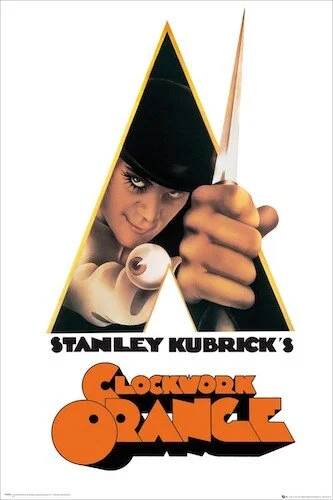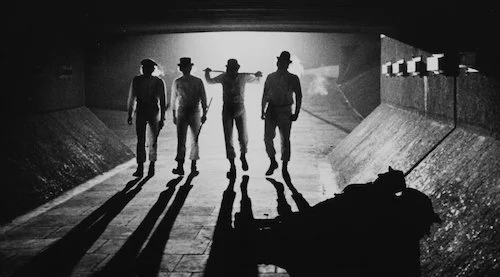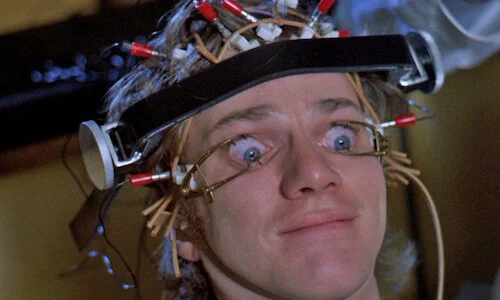A Clockwork Orange: On-This-Day Thursday
Written by Andreas Babiolakis
Every Thursday, a starry sinny released on this opening weekend years ago will be smotted. They can be dorogoy, or bolshy veshches.
For February 2nd, we will viddy at A Clockwork Orange.
Alright, grab a seat and get all dobby-like, my droogs. I can’t condone moloko plus, for I am a reliable chelloveck here that aims to be sammy with you and this literary lomtick I’ve gone and written (excuse the baddiwad Nadsat, for I am fuzzy). The book I claim to be bolshy amongst any other is A Clockwork Orange by Anthony Burgess, who casts a zemmechat tale of institutionalized mozg-washing via the juvenile escapades of one Alex DeLarge. At a molodoy age, I recall dressing up as this veck for All Hallows’ Eve, only for no one to recognize this litso (platties and all). Burgess left an impression on me; I admired his oomny, and the ability to craft slovos inspired by other languages like Russian and English slang.
Stanley Kubrick tried his rooker at this story with A Clockwork Orange: a real horrorshow sinny that helped oobivat the Hollywood we once new (right in the morder). This X-rated gamble was Kubrick’s choodessny way of getting bolder than he ever was previously (in a way that took some real keeshkas, if you know what I mean). Young me was so ready for this. Never had a book privodeeted me towards other literature, with the messel of finding more like this. Let’s rabbit. First, it’s no shilarny that Kubrick concludes his version early, before we see an extra chapter of this Britain. He prioritizes Alex DeLarge’s “curing” of his rasoodock deemed bezoomy by the inconveniences of society. Slightly incomplete? Yes. Burgess’ raskazz is the transformation of DeLarge, underneath the question of ethics: is it best to leave prestoopniks to rot for their doings, or do we give them the ol’ Ludivico Technique and wash their souls against their wills? Kubrick’s DeLarge seems to ookadeet a guilty lad with few repercussions.
The four droogs find this ded with shlagas.
While a preference of yours truly, Kubrick’s version is unlike chepooka I say, because you can shazat that this retelling is a warning to all: evil lives, my brothers and sisters. In spite of these embellishments (that Kubrick never did slooshy anyone but his own great gulliver), A Clockwork Orange is a poogly sight of civilization (or the lack thereof), as molodoy rapscallions tear down streets and prey on bolnoy loners, and adults are left neglected. What a shame. T’was only inevitable that souls would be grazzy, either by oddy-knocky regret (all plenny-like), or the influence of fellow sarky rots that razrez your innocence into malenky pieces. DeLarge is only an odin of society’s cal that one cannot cheest. It’s too late. You’re born into a razdrez existential misery.
Kubrick’s dorogoy vision is white like moloko: a tabula rasa of an impressionable mozg (plus a disturbingly bright screen to smot). Any drop of crimson krovvy feels like the unrest of purity. Ah yes, the use of the great Ludwig van is to smash brilliance and evil into one pile: a juxtaposition to filly the joy of the classics and slooshy genius when there’s grazhny death and violence set to it. Oh, it’s choodessny, my readers, especially forty nine years ago; viddy this, if you will, a mainstream shaken up by merzky strack. A Clockwork Orange does itself a mischief by going too far; Burgess’ book can disguise its misdeeds under deceptive lingo, whereas Kubrick’s sinny is clear as day to gaze upon. Therefore, I skazat that the taboo events are problematic without much payoff (I’m sorry, my chellovecks, for what your glazzies are spotting).
What would you do for a Klondike bar?
Fear no, for most of A Clockwork Orange is dobby indeed: I horn this be worthy of your gollies, friends. Beware its unapologetic ways: a veshch Burgess treated all wisely like, but escaped Kubrick’s quest to strike strack in Hollywood orthodoxy. A soviet to leave with you to pony A Clockwork Orange as a sinny is to viddy this flick as the counterculture statement it is, but maybe ookadeet its philosophies alone, for some real rabbit could make them more whole and mindful (like Burgess’ raskazz). While not a Kubrick masterpiece (he does have tree or more, sure), it’s horrorshow enough to give a go; at least an odin spin just to test, no? Whether this is your knife, is for you to find out for yourself.
Andreas Babiolakis has a Masters degree in Film and Photography Preservation and Collections Management from Ryerson University, as well as a Bachelors degree in Cinema Studies from York University. His favourite times of year are the Criterion Collection flash sales and the annual Toronto International Film Festival.







